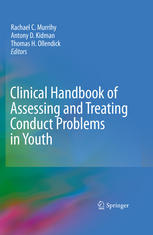

Most ebook files are in PDF format, so you can easily read them using various software such as Foxit Reader or directly on the Google Chrome browser.
Some ebook files are released by publishers in other formats such as .awz, .mobi, .epub, .fb2, etc. You may need to install specific software to read these formats on mobile/PC, such as Calibre.
Please read the tutorial at this link: https://ebookbell.com/faq
We offer FREE conversion to the popular formats you request; however, this may take some time. Therefore, right after payment, please email us, and we will try to provide the service as quickly as possible.
For some exceptional file formats or broken links (if any), please refrain from opening any disputes. Instead, email us first, and we will try to assist within a maximum of 6 hours.
EbookBell Team

5.0
18 reviewsConduct problems, particularly oppositional defiant disorder (ODD) and conduct disorder (CD), are the most common mental health problems affecting children and adolescents. The consequences to individuals, families, and schools may be severe and long-lasting. To ameliorate negative outcomes and ensure the most effective treatment for aggressive and antisocial youth, early diagnosis and evidence-based interventions are essential.
Clinical Handbook of Assessing and Treating Conduct Problems in Youth provides readers with both a solid grounding in theory and a comprehensive examination of the evidence-based assessment strategies and therapeutic practices that can be used to treat a highly diverse population with a wide range of conduct problems. It provides professional readers with an array of evidence-based interventions, both universal and targeted, that can be implemented to improve behavioral and social outcomes in children and adolescents.
This expertly written resource:
This volume serves as a one-stop reference for all professionals who seek a solid grounding in theory as well as those who need access to evidence-based assessment and therapies for conduct problems. It is a must-have volume for anyone working with at-risk children, including clinical child, school, and developmental psychologists; forensic psychologists; social workers; school counselors and allied professionals; and medical and psychiatric practitioners.